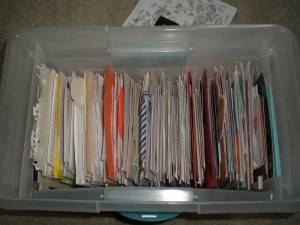The ELEN chapter of ABWA in Alpharetta recently invited me to speak about o rganizing and time management for entrepreneurs at their monthly luncheon. We had an excellent time networking with the members of this group and wanted to share some of the tips we gave in our presentation. In order to manage the variety of daily obligations that entrepreneurs face, we recommended focusing on four organizational areas:
rganizing and time management for entrepreneurs at their monthly luncheon. We had an excellent time networking with the members of this group and wanted to share some of the tips we gave in our presentation. In order to manage the variety of daily obligations that entrepreneurs face, we recommended focusing on four organizational areas:
Routines & Task Management:
The importance of routine in your daily, weekly, and yearly lives cannot be underestimated. We recommend, taking a look at the things your business requires of you on a regular basis and then begin to set up routines that will allow you to accomplish each task in the most efficient way. You should also schedule time to prepare for upcoming days and weeks. Sunday evening is a great time for this on a weekly basis. Below are a couple additional tips for integrating routines into your life.
- Prioritization: Decide what the top 3 things need to happen each day and commit to getting them done.
- Requests for info/action from others should happen in the morning
- Batching: Group tasks into categories when making your to-do list (phone calls, emails, physical tasks, meetings, professional tasks, personal tasks, etc.)
Managing Email, Calls & Interruptions:
Dealing with the daily influx of demands for an entrepreneur can be difficult. In order to achieve the greatest efficiency, we recommend telling others what style of communication you prefer. For example, if you are best on email, tell employees and others that they should reach you in that manner. This way you will not be bombarded with phone calls or in-person drop-bys that drain you of time. A few more tips are below.
- Email Inbox: Use for items that need current action. File all other emails in well-labeled folders immediately upon receipt. Review and clean out folders weekly.
- Closed-Door Time: Schedule time each day when you will silence the phone, close the office door, and turn off email, so that you can finish necessary tasks
Paper Management:
This is the most common concern among entrepreneurs. Managing the necessary, and not so necessary, paper that comes into the business can quickly become unmanageable. We’ve outlined our best tips for keeping the paper under control below.
- Filing: Use well-labeled files (physical or digital) and commit to reviewing the contents once per quarter. Shred, toss, or recycle unnecessary items or things that haven’t been needed in 1+ years. Google ‘Suze Orman what to keep documents’ for a list of must keep financial docs with timelines.
- Expenses: Keep track of receipts for business with an app like Expensify or a desk scanner like NeatDesk.
- Go Paperless: Attempt to eliminate all paper from your life by scanning, opting out of paper statements/mail, and not printing. Digital records are easier to search, permanent (if stored safely), and require less space.
Needing Assistance: (Personal Assistance, Professional Assistance, and/or C-Level)
A final issue that we commonly see with entrepreneurs in not knowing when to get help. Whether it’s an assistant, an employee, or even a C-level adviser it is important to bring on assistance if it will help your business grow or efficiently maintain. If you are dealing with one of the below issues, it probably means you could use some help.
1) Your work/life balance is suffering
2) You’re in over your head
3) You’re doing tasks poorly and taking more time than the job should require because it is not your expertise
4) You’re doing tasks that are below your level when you could be focusing on more important things.
We hope these tips for entrepreneurs are helpful and would love to hear your favorite organizational ideas for people with their own businesses.
TWOW


